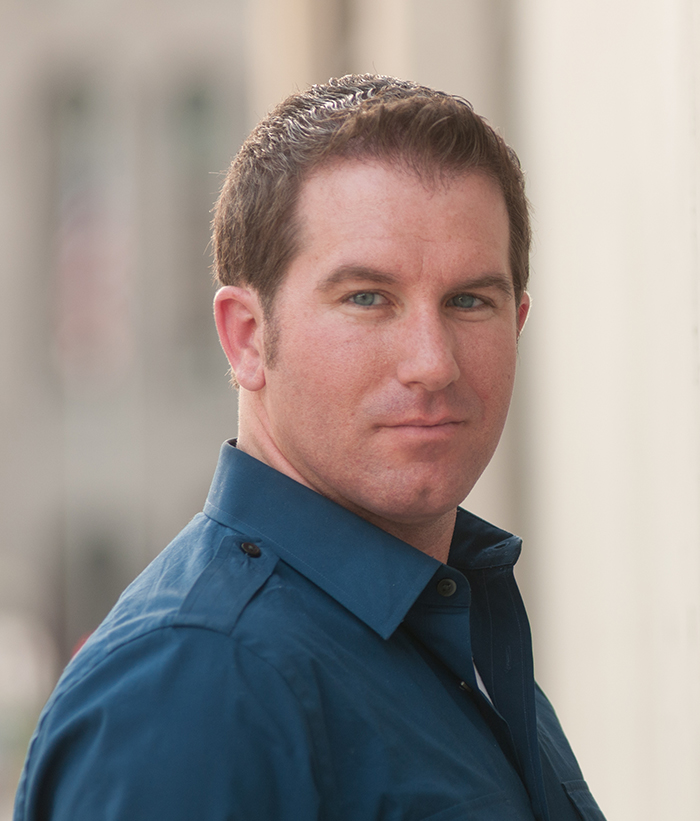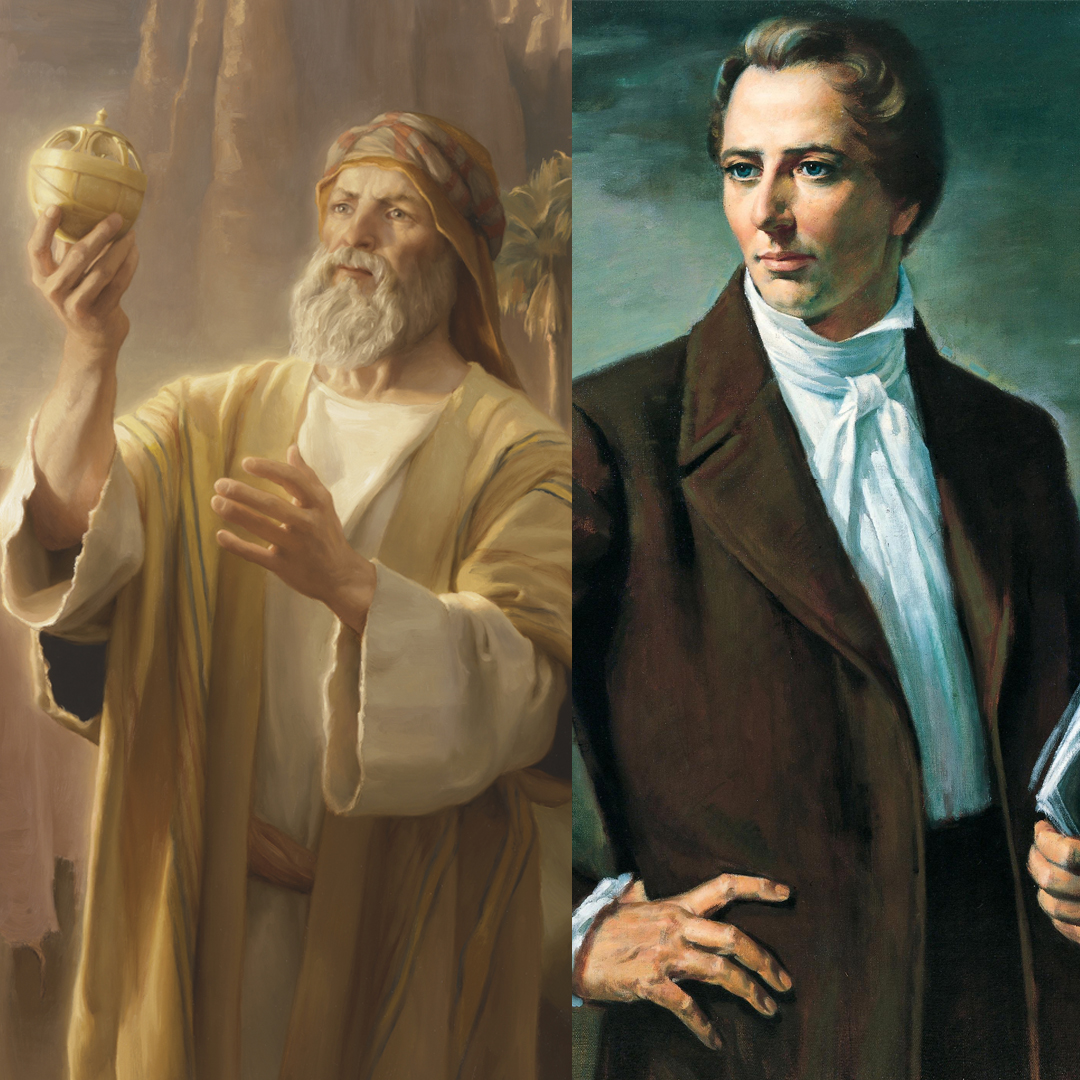 Recently, after binging a bit on The Church of Jesus Christ of Latter-day Saint's Book of Mormon videos, I decided to begin reading the Book of Mormon again with a fresh set of eyes. Like many of you, I have read through the Book of Mormon countless times, and while I had been reading towards the end of the book of Alma, something in Nephi's story called me back to those beloved words, "I, Nephi, having been born of goodly parents..."
Recently, after binging a bit on The Church of Jesus Christ of Latter-day Saint's Book of Mormon videos, I decided to begin reading the Book of Mormon again with a fresh set of eyes. Like many of you, I have read through the Book of Mormon countless times, and while I had been reading towards the end of the book of Alma, something in Nephi's story called me back to those beloved words, "I, Nephi, having been born of goodly parents..."
But as I was reading through Nephi's account, it wasn't his experiences that stuck out to me, at least not this time. It was his father's.
I think I've been guilty of seeing Lehi as kind of a background character that played an important part of the story, but was overshadowed by the brilliant light of Nephi's faith, obedience, patience, humility and strength. Oh, how wrong I was.
I never noticed it in any of my previous readings of the Book of Mormon, but Lehi was the Joseph Smith of his day (and the Nephite's dispensation). Let me explain that statement by analyzing just a few of the many similarities between Father Lehi and Brother Joseph. And when you finish this article, don't hesitate to message me with your thoughts about what I wrote. These comparisons have helped me understand both Lehi and Joseph to a greater degree and I am curious to see what you, dear reader, have to say.
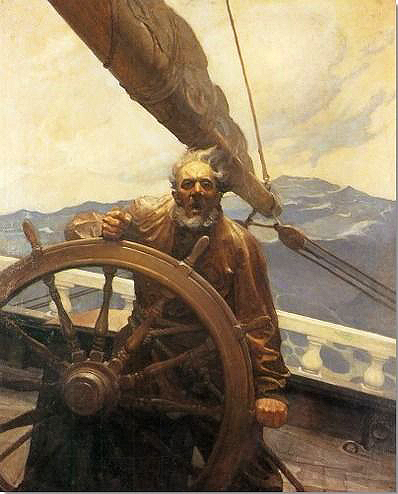 Several years ago my friends and I enjoyed an unforgettable 7-day cruise down to the Mexican Riviera. While not my first (or last) cruise, we had loads of fun onboard during the journey south to our first port of call, Puerto Vallarta. The weather was perfect as we toured the city's sites and my friends were impressed with my handle of the Spanish language due to my two-year mission to Honduras and Belize a few years earlier.
Several years ago my friends and I enjoyed an unforgettable 7-day cruise down to the Mexican Riviera. While not my first (or last) cruise, we had loads of fun onboard during the journey south to our first port of call, Puerto Vallarta. The weather was perfect as we toured the city's sites and my friends were impressed with my handle of the Spanish language due to my two-year mission to Honduras and Belize a few years earlier.
After everyone had purchased their desired souvenirs and knick-knacks we made our way back to the ship where we discovered some ominous news. When I turned on my cabin's TV, I noticed that the yellow spinning circle with wings to the northwest of us had turned red. The former tropical storm now had an official name as a hurricane. Even worse, it was tracking in nearly direct-east which meant that it would hit Cabo San Lucas the same day we were scheduled to be in port there.
That evening, conversations around the ship, especially in the dining areas, understandably focused on the storm's new status. The more worried (i.e. high-strung) onboard wondered what would happen if the storm did hit us while in port. What if there were dangerously high-winds or hail or water spouts or tsunami's or zombies or the apocalypse itself occurred?! I'm sure wills were double-checked, final letters home written and last meals devoured (or maybe that was just their normal cruising appetites).
Ok, maybe it wasn't that bad, but some people onboard were making it sound that bad. I admit I tried to stifle some grins as I heard some of the worries voiced aloud as we walked around the ship. Maybe it was because I had already been through two hurricanes (albeit on shore), one tornado (also on shore), three earthquakes + aftershocks, several tropical storms, and so on, but I wasn't really that worried. I knew just how strong cruiseships were made to be and how rigorous the safety guidelines are, but there was also one factor that all the worried cruisers ready to send out an S.O.S. were forgetting.
As I sat eating my breakfast the next morning, the familiar chime was overhead on the ship's Public Address system and the calm, reassuring voice of our captain explained the situation and reminded us of just how strong the ship was. He then went on to say that while our previously planned itinerary was going to be adjusted to avoid the storm, it was for our good and that we should all enjoy our time in Mazatlan that day.
I could see the relieved looks on faces around the Lido Deck and that day I was reminded of a very important lesson that would do us all well to remember at this unsettled time in the world:
When facing a storm, look to the captain.
The Storms in our Lives
2,000 years ago another group of water-bound travelers found themselves in a similar situation, although their small fishing boats were hand-made and the storm they faced came upon them so suddenly that there was no avoiding it. In Mark 4:37 we read, "And there arose a great storm of wind, and the waves beat into the ship, so that it was now full."
Among the disciples of Jesus, those now battling so fiercely to keep the water-laden ships afloat, were several experienced fishermen whom the Lord had called and ordained to become "fishers of men" (Mathew 4:18-22). But the humble apostles were neither searching for men nor fish, but rather for a way to survive the raging tempest.
As Elder Howard W. Hunter once explained, "The Sea of Galilee is quite low, about 680 feet below sea level, and the heat becomes quite great. The hills surrounding the water rise up very sharply and to considerable height. The cold air rushing down from the hills meets the warm air rising from the lake in such a way that sudden and temporarily violent storms can occur on the surface of that inland sea."
It was in the middle of such a storm that Jesus and his apostles found themselves, yet while his disciples labored with all their skill and strength to keep from drowning, their master was asleep on the ship's stern (Mark 4:38). That they loved him there is no question, but the stress of the situation must have been wearing on them. After all, the storm had been lashing their small ships for likely several hours. Whether all the disciples were with Jesus in the same ship or spread throughout the group is irrelevant, yet the author in me has always tried to imagine the battered disciples discussing the storm, then wondering among themselves how the Master could sleep through it all!
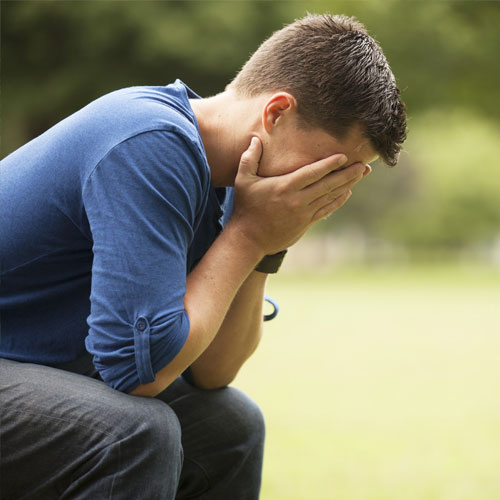 When I look at the current state of the world, I wonder how many of us feel like we are in "a great storm of wind, and...waves..." which are beating "into (our) ship, so that it (is) now full."
When I look at the current state of the world, I wonder how many of us feel like we are in "a great storm of wind, and...waves..." which are beating "into (our) ship, so that it (is) now full."
With all the economic uncertainties, the physical distresses, the fears of illness especially from COVID-19 ("the Coronavirus"), the amount of jobs lost, the worries about food and medicines, the continued wars between countries and factions, the wide gulfs between political beliefs, the increased strains of parents who are trying to be provider and educator, the heartaches of those who have lost loved ones, the daily reports of earthquakes and hurricanes and fires and murders and so on, well... Does anyone else feel like they are battling to keep their ship afloat in the middle of the storm?
And perhaps, just perhaps, we may find moments where we wonder if the Lord is asleep, if he is too busy caring for others to care for us? Maybe the wind is rising, the rain is falling and the waves of anxiety or fear are crashing against the hull of our hope and faith. As we feel the heavy weight of loss or fear, maybe we, like the apostles of old, seek the Lord, crying out in our anguish through prayer, "Master, carest thou not that (I) perish?" (Mark 4:38).
Peace, Be Still
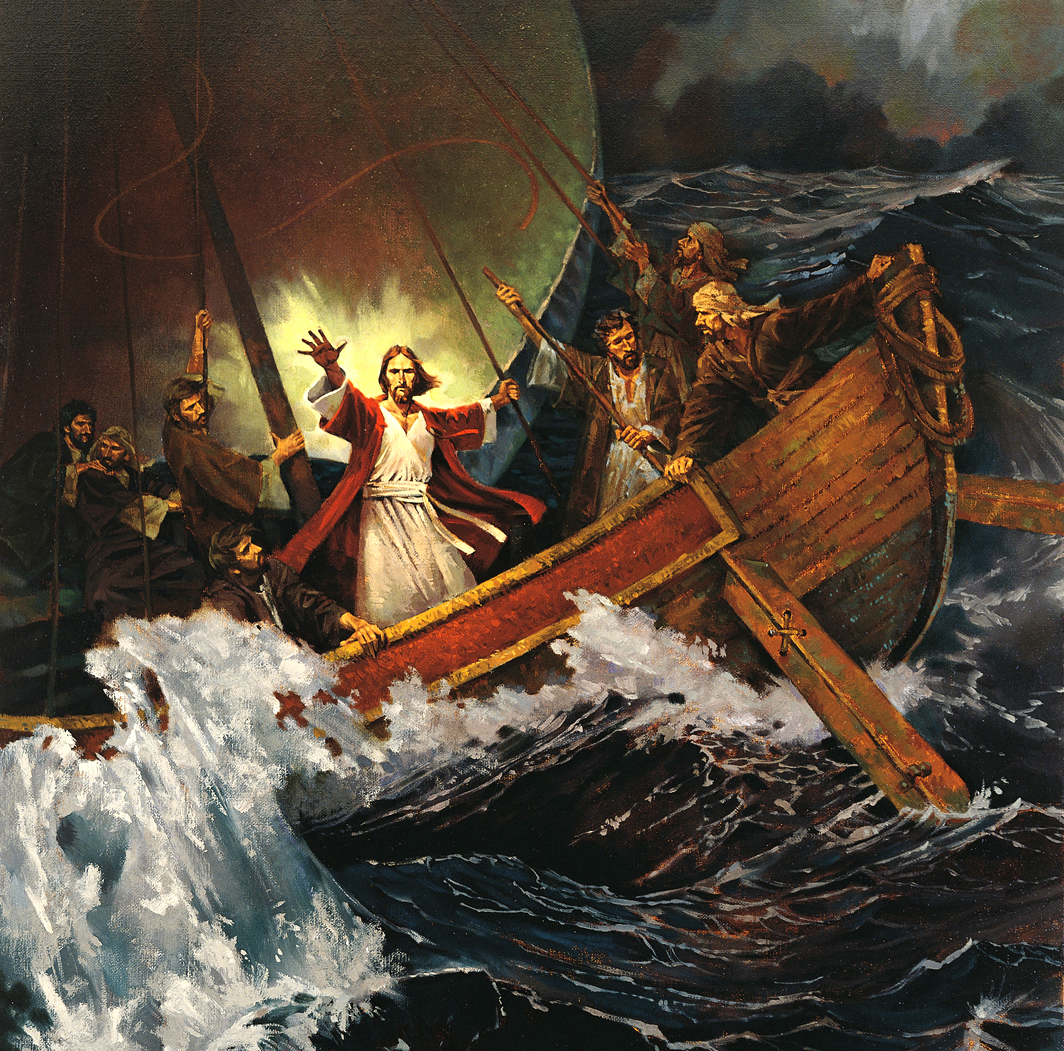 I think most of us have been through enough in life to know the answer to that question. We have experienced the agony of divorce or the heartache of heartbreak. We have cried more tears than we can count (but He can) over fears, sorrows and losses. We have clung to our faith like those disciples clung to the sides of the boat. We have labored with all our might to make it through the storms we have encountered along the voyage of life with enough long nights spent wondering if we really can survive the tempest.
I think most of us have been through enough in life to know the answer to that question. We have experienced the agony of divorce or the heartache of heartbreak. We have cried more tears than we can count (but He can) over fears, sorrows and losses. We have clung to our faith like those disciples clung to the sides of the boat. We have labored with all our might to make it through the storms we have encountered along the voyage of life with enough long nights spent wondering if we really can survive the tempest.
We have reached for God through prayer, fasting, service to others, scripture study, temple worship, journaling, and simply stretching our minds to find him.
And every time, in His own due time, the Lord stands and with his mighty hand declares, "Peace, be still. And the wind ceased, and there was a great calm." In this, our personal stories reflect the truths of the disciples' accounts, in that He had control over the storm the entire time.
And it may not be in this lifetime that we will fully understand why our trials and adversities and troubles came into our lives, but the Lord will still lovingly ask us the same thing: "Why are ye so fearful? how is it that ye have no faith?"
Perhaps His mighty command was not just to the sea, but rather directed towards the sailors, and to us: "Peace, be still."
Master, the Tempest is Raging
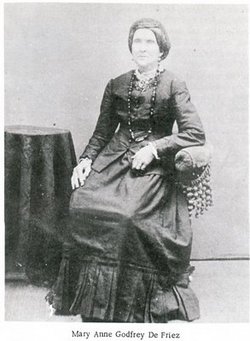 Most of us who believe in God have no doubt that this story is true, the Jesus Christ did indeed calm the storm on the Sea of Galilee.
Most of us who believe in God have no doubt that this story is true, the Jesus Christ did indeed calm the storm on the Sea of Galilee.
The real trick is to believe He can do the same for us.
After their parents died of tuberculosis, Mary Ann Baker-Godfrey de Friez (1822-1902), her sister and her brother continued to live together in Chicago, IL until her brother contracted the same disease. Mary Ann and her sister used what little money they had to send their brother to Florida in the hopes that the climate would ease his condition, but while his health initially improved, unfortunately their brother soon followed their parents in death.
Having spent all their money in sending him to Florida for recovery, the sisters lacked the funds and the health to travel south for the funeral nor bring their brother's body home for burial.
Mary Ann was heartbroken. She cried out in her own anguish, "God does not care for me or mine. This particular manifestation of what they call ‘divine providence’ is unworthy of a God of love. I have always tried to believe on Christ and give the Master a consecrated life, but this is more than I can bear. What have I done to deserve this? What have I left undone that God should wreak His vengeance upon me in this way?”
When I look at how many in the world today are cursing God for their losses or raising their first towards the Heaven in displeasure with the way their lives are going, I wonder how many could repeat Mary Ann's words verbatim.
But God had not forsaken the Bakers. As He does in our lives, the same Master who calmed the Sea of Galilee sent daily blessings to calm the troubled seas in Mary Ann's heart. She later wrote, "I became wickedly rebellious at this dispensation of divine providence. I said in my heart that God did not care for me or mine. But the Master’s own voice stilled the tempest in my unsanctified heart, and brought it to the calm of a deeper faith and a more perfect trust."
Though she had faced the storm, Mary Ann knew as I knew when facing the hurricane in Mexico, that when storms arise, look to the captain of the ship.
And because she was willing to look to the Captain of our Souls, Mary Ann later penned the magnificent hymn, "Master, the Tempest is Raging."
Though her heart had grown fearful and bitter with her brother's loss, this faithful woman wrote with with a grateful and changed heart:
Master, the terror is over.
The elements sweetly rest.
Earth’s sun in the calm lake is mirrored,
And heaven’s within my breast.
Linger, Oh, blessed Redeemer!
Leave me alone no more,
And with joy I shall make the blest harbor
And rest on the blissful shore.
Peace - Be of Good Cheer
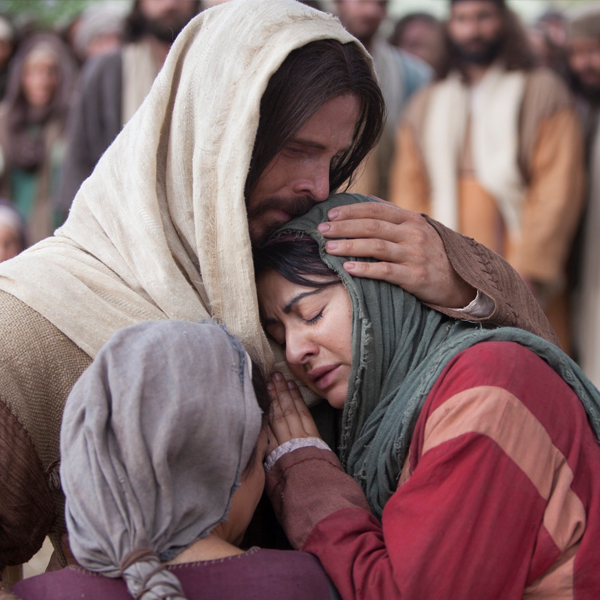 I do not know what tempest you are facing in your life at this time. Maybe it is the loss of a job or some illness or perhaps you are feeling overwhelmed by loneliness or the demands of life or the pains of perceived inadequacies.
I do not know what tempest you are facing in your life at this time. Maybe it is the loss of a job or some illness or perhaps you are feeling overwhelmed by loneliness or the demands of life or the pains of perceived inadequacies.
If you feel the waves of sorrow, fear, pain or even sin crashing against the hulls of your soul, may you remember the words of the Savior who said, "In the world ye shall have tribulation: but be of good cheer; I have overcome the world." (John 16:33.) He has the power to calm both the storm, and the sailor.
If you are craving peace for your storm-filled life, hold fast to the Lord's words when he said, "Peace I leave with you, my peace I give unto you: not as the world giveth, give I unto you." (John 14:27.)
Even if you feel your life, or faith, is too broken, remember that the resurrected Lord's first words to his disciples were, “Peace be unto you.” (John 20:19.)
Peace. Be of good cheer. I feel that those five words are exactly what the world needs right now. We need to remember that "the Lord is God" (Joshua 22:34) and that "even the wind and the sea obey him..." (Mark 4:41). And while he was speaking of Rome's naval power, Cicero spoke an eternally comforting truth when he said, "He who commands the sea has command of everything.”
My beloved friends, no matter what storms come your way, "Be still and know that (He is) God....The Lord of hosts is with us; the God of Jacob is our refuge."
As Mary Ann Baker wrote, "Whether the wrath of the storm-tossed sea or demons or men or whatever it be, no waters can swallow the ship where lies the Master of ocean and earth and skies. They all shall sweetly obey [his] will. Peace, be still!"
Amen.
To read more of Jeremy's work, you can order one of his highly-acclaimed books by visiting the Online Store to purchase signed copies or unsigned ones by purchasing a copy wherever books are sold.
Highlighted Posts
The Eagle and the Mouse: A Lesson on Perspective
29 October 2018 in Motivational 14306 hitsGrowing up in Oklahoma I was lucky to be exposed to both the histories and the teachings of the area's…
The Future Spouse Jar
08 September 2014 in LDS Midsingles 10438 hitsAdmit it, the title alone intrigued you. "Is he trying to grow a spouse in a jar like this?" No,…
13 LDS Midsingle Articles of Faith
16 March 2015 in LDS Midsingles 31292 hitsLet's face it: the LDS midsingles world is a complicated conglomeration of faith and fun, uplifting moments and crushing disappointments.…
Essay 7: LDS Midsingles - To the Rescue
04 September 2016 in LDS Midsingles 8991 hits*Note: This essay is the seventh of seven authored by Jeremy for the LDS Midsingle (31-45+) community. The opinions and…
Essay 5: Breaking Down Our Walls
17 April 2016 in LDS Midsingles 11889 hits*Note: This essay is the fifth of seven authored by Jeremy for the LDS Midsingle (31-45+) community. The opinions and…
30 Days of Thankful-ness Giving
29 October 2014 in Motivational 8260 hitsOften during the month of November we see "30 Days of Thanksgiving" challenges that push us to develop gratitude for…
The Stories Behind the Story
30 December 2013 in Books 14666 hitsAfter gathering up questions from social media outlets, we sat down with him to get answers about bobsled and his…
In the Mind of LDS Midsingles...
29 July 2014 in LDS Midsingles 20081 hitsBehold! Oh ye married people, this is a once-in-a-lifetime trip inside the mind of your single and midsingle friends! While…


